Transforming the social work and community health landscape
Join us for this year’s Social Work and Community Health Summer Institute (SWSI) from May 20th to 31st, 2024, on Zoom to learn about the latest practical social work and community health skills. Workshops are free to attend, made possible by West Virginia University, An Giang University, and Pacific Links Foundation. Learn and share your experience with us!
We invite participants who are:
- Social workers, community health workers, collaborators, and partners of local and international NGOs
- Staff, faculty, and students of social work/ public health at universities
- Working in social work/ community health services
- Interested in social work/ public health
All workshops will be presented in Vietnamese and English. SEE TENTATIVE WORKSHOP TOPICS.
Cùng chúng tôi chia sẻ về chương trình, giới thiệu đến bạn bè cũng như những người quan tâm qua FACEBOOK
2024 SWSI schedule
Opening ceremony: May 20, 2024, from 7:00am to 7:30am VN time.
The conference is held from May 20, 2024 to May 31, 2024. Each day there are 2 working sessions: session 1 starts at 7:00am. and ends at 10:00am., session 2 starts at 10:30am. and ends at 1:30pm. The workshop includes 16 topics (each topic is presented as a workshop) conducted by individual experts or groups of experts.
Note: The first workshop will start at 7:30amClosing ceremony: May 31, 2024, from 1:30pm to 2:00pm VN time.

Although human trafficking is thought to be a highly clandestine crime, emerging data indicate that victims of human trafficking commonly present for healthcare services during and after trafficking. These situations may present opportunities for identification and intervention. However, identification and intervention require clinicians to have a working knowledge of the signs of human trafficking, effective methods of interacting with victims of human trafficking safely, and the resources available for intervention. This workshop will introduce participants to the known signs of human trafficking; common reasons for presentation to various medical settings; common healthcare needs of human trafficking survivors; common needs and available resources for intervention; and an algorithm for deciding if, how, and when to intervene in a way that maximizes safety and respect for the victim.
Dr. Patrick Kerr, Ph.D., Licensed Clinical Psychologist.Patrick is Chief Psychologist and an Associate Professor in the Department of Behavioral Medicine and Psychiatry at West Virginia University School of Medicine’s Charleston Campus, where he directs the WVU Behavioral Science and Psychopathology Research Division. He also directs the WVU Dialectical Behavior Therapy Services Program. His research and scholarly work encompass suicidal behavior and NSSI; emotion regulation; traumatic stress; human trafficking; and neurobiological bases of behavior, with an emphasis on the endogenous opioid system. Dr. Kerr serves as a member of the West Virginia Human Trafficking Task Force. He has actively contributed to the development and implementation of the train-the-trainer program for human trafficking training in the state of West Virginia. His work in the human trafficking field has included authoring multiple peer-reviewed publications, including book chapters on intersectionality and the lived experience of people experiencing human trafficking survivors. Dr Kerr has contributed to U.S. anti-trafficking initiatives and projects. Patrick was a member of the inaugural HEAL Trafficking Train-the-Trainer Training class (2019). He also served as a contributing editor to the development of the HEAL Trafficking Protocol Toolkit for Developing a Response to Victims of Human Trafficking in Healthcare Settings.

This workshop focuses on common factors between the most used models of trauma therapy. Participants will examine the issues of memory reconsolidation, selfregulation, preferred narratives, and mindful changes in perspective. Attendees will be encouraged to develop their own culturally competent approaches to trauma therapy. This workshop will be both didactic and experiential in terms of teaching style. Workshop #4 will be a continuation of what was started in Workshop #2.
James Keim, MSW., LCSW.James is a past associate of the Mental Research Institute and the Washington Family Therapy Institute, he now has a private practice in San Francisco. He is a fellow of the American Association for Marriage and Family Therapy. He is co-author of the book, The Violence of Men, and a contributor to other texts on therapy with children and families. Mr. Keim is a Fulbright Specialist who completed his service in Vietnam and has taught workshops internationally on trauma therapy.
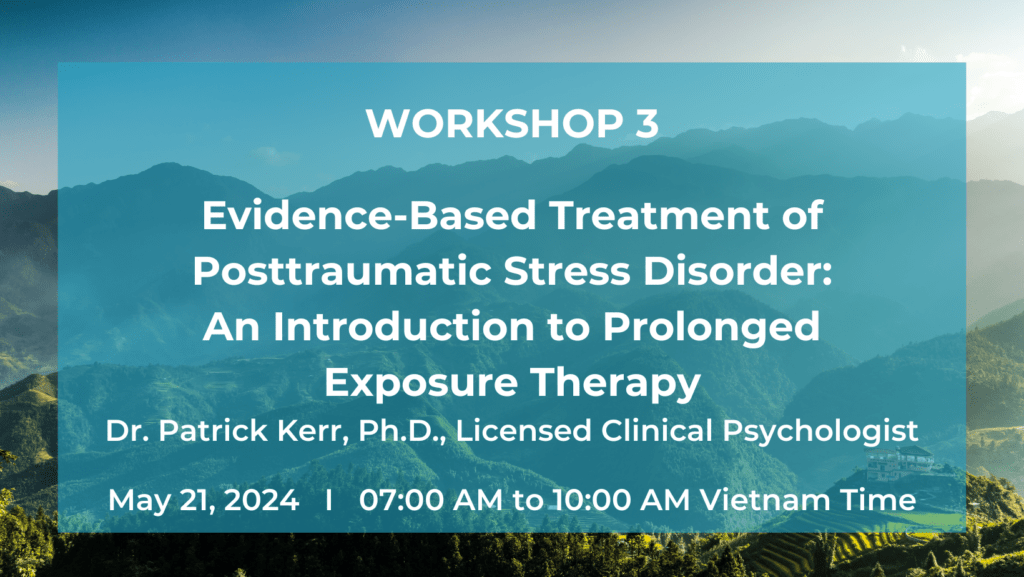
Trauma is an increasingly common phenomenon for many people globally. The most significant effect of trauma is posttraumatic stress disorder (PTSD), which can be debilitating without effective treatment. Prolonged exposure therapy (PET) is one of the best researched treatments with strong empirical evidence for the treatment of PTSD. This workshop will introduce participant to the treatment of PTSD using PET, including: the scientific literature supporting PET; key steps in the PET treatment process; common challenges in PET; indications and contraindications for PET.
Dr. Patrick Kerr, Ph.D., Licensed Clinical Psychologist.Patrick is Chief Psychologist and an Associate Professor in the Department of Behavioral Medicine and Psychiatry at West Virginia University School of Medicine’s Charleston Campus, where he directs the WVU Behavioral Science and Psychopathology Research Division. He also directs the WVU Dialectical Behavior Therapy Services Program. His research and scholarly work encompass suicidal behavior and NSSI; emotion regulation; traumatic stress; human trafficking; and neurobiological bases of behavior, with an emphasis on the endogenous opioid system. Dr. Kerr serves as a member of the West Virginia Human Trafficking Task Force. He has actively contributed to the development and implementation of the train-the-trainer program for human trafficking training in the state of West Virginia. His work in the human trafficking field has included authoring multiple peer-reviewed publications, including book chapters on intersectionality and the lived experience of people experiencing human trafficking survivors. Dr Kerr has contributed to U.S. anti-trafficking initiatives and projects. Patrick was a member of the inaugural HEAL Trafficking Train-the-Trainer Training class (2019). He also served as a contributing editor to the development of the HEAL Trafficking Protocol Toolkit for Developing a Response to Victims of Human Trafficking in Healthcare Settings.

This workshop focuses on common factors between the most used models of trauma therapy. Participants will examine the issues of memory reconsolidation, selfregulation, preferred narratives, and mindful changes in perspective. Attendees will be encouraged to develop their own culturally competent approaches to trauma therapy. This workshop will be both didactic and experiential in terms of teaching style.
James Keim, MSW., LCSW.James is a past associate of the Mental Research Institute and the Washington Family Therapy Institute, he now has a private practice in San Francisco. He is a fellow of the American Association for Marriage and Family Therapy. He is co-author of the book, The Violence of Men, and a contributor to other texts on therapy with children and families. Mr. Keim is a Fulbright Specialist who completed his service in Vietnam and has taught workshops internationally on trauma therapy.
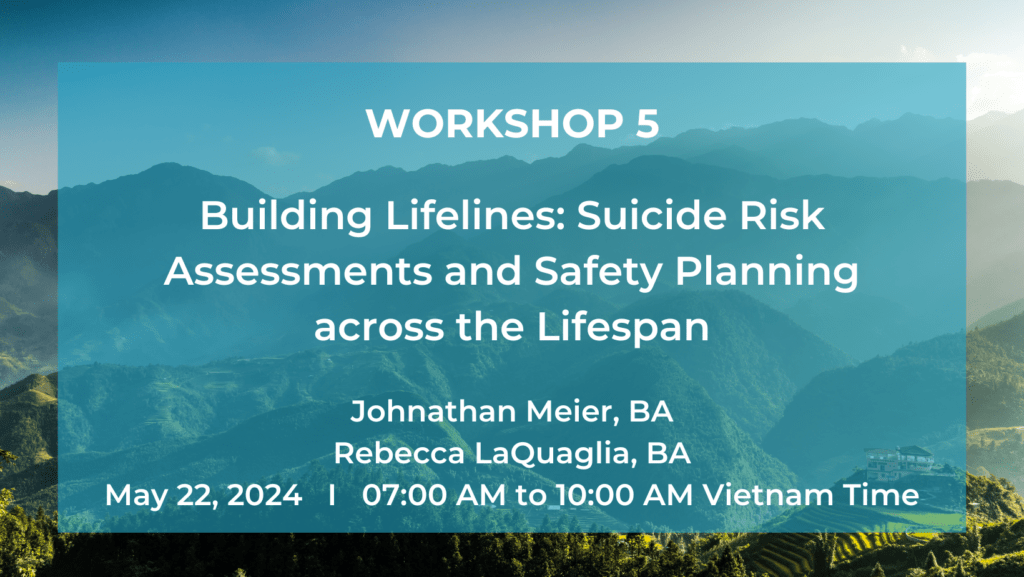
Suicide is the 12th leading cause of death overall in the U.S., claiming the lives of over 45,000 people in 2020 (CDC, 2021). More specifically, suicide was the second leading cause of death among individuals between the ages of 10-14 and 25-34, third leading cause between the ages of 15-24, and the fifth leading cause between the ages of 35 and 44 (CDC, 2021). This workshop will offer attendees an overview of risk factors that increase the probability of committing suicide, guidance on how to complete risk assessments with individuals across the lifespan, and how to conduct effective safety planning to minimize risk and keep individuals safe. A summary of theories of suicide, how to address barriers to utilizing a safety plan, basic psychological first aid training for those outside of the mental health field, and innovative digital tools to use with clients will be presented.
Johnathan Meier, BA.Johnathan is a second-year doctoral student in psychology at West Virginia University. Presently he is a graduate assistant in the Memory and Law lab. He received his bachelor’s degree in psychology from the University of Kentucky in 2020. He is interested broadly in forensic psychology, specifically in juror perceptions and eyewitness testimony
Rebecca LaQuaglia, BA.Rebecca is a second-year doctoral student in the Adjustment to Disease and Adherence Pediatric Team Lab (ADAPT) and a member of the Pediatric Lab for Adherence and Transition. She received her bachelor’s degree in psychology from Drexel University. Rebecca’s primary research interests lie in the development of interventions aimed at improving treatment adherence in youth with chronic conditions, the role of peer relationships in treatment adherence in adolescents with chronic conditions, and factors that facilitate positive adjustment to receiving a diagnosis in youth and their families.
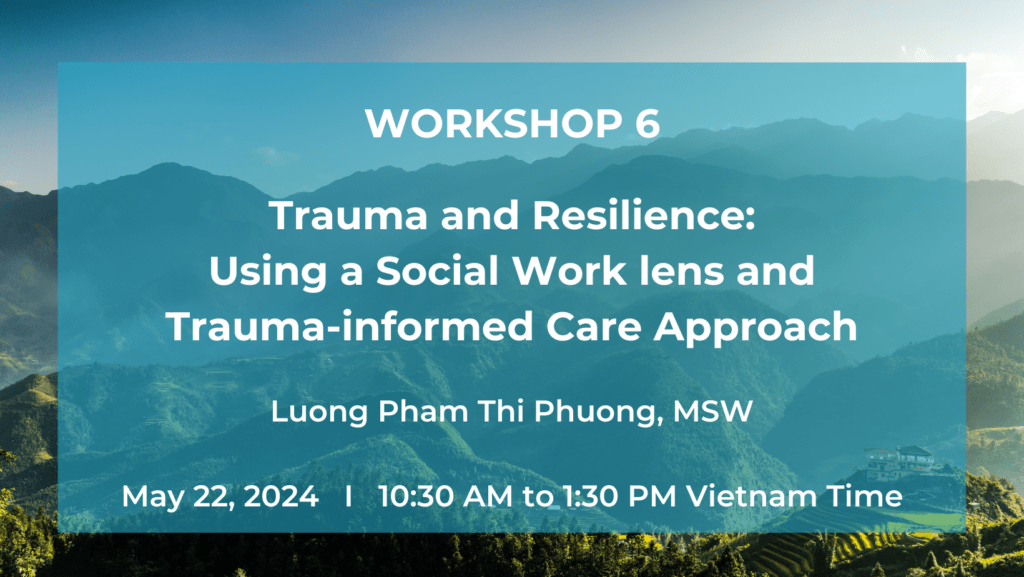
The power imbalance in understanding trauma will be examined with an eye toward prioritizing the empowerment and autonomy of survivors in their own healing process. Understanding resilience as a process of healing that involves looking at interactions between survivors and their environments, that draws upon ecological theory and principle of safety (social safety) will be considered as central foci of trauma-informed care practice.
Luong Pham Thi Phuong, MSW.Phuong earned her MSW from Flinders University in South Australia, where she was on an Australia Awards Scholarship. For the past 8 years she has dedicated herself to social work and mental health wellbeing in Vietnam. In 2020 she joined Hagar International in Vietnam as a Crisis Hotline Worker and Case Manager. Currently her focus has shifted to individual social work practice, supporting survivors of domestic violence, sexual abuse, and human trafficking. She is passionate concerning the empowerment of children and youth who experience trauma believing in their potential and is committed to supporting them on their healing path.
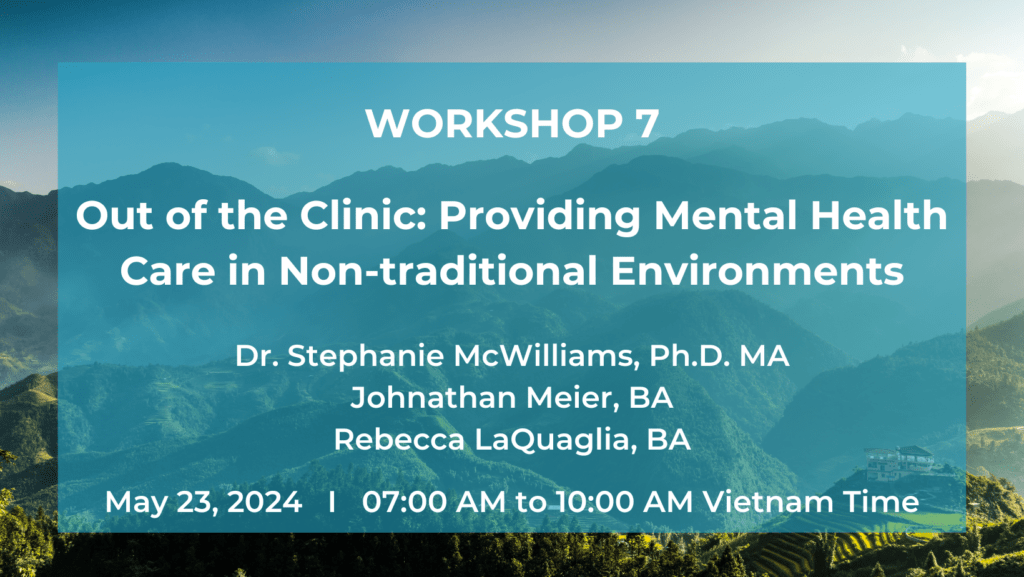
The prevalence of mental health issues among youth, with nearly half meeting diagnostic criteria for a mental health disorder and suicide being a leading cause of death, underscores the urgency for effective intervention (National Institute of Mental Health, 2023). In environments such as summer camps, hosting millions of children annually, adult leaders are urged by the American Camp ssociation to establish mental health support, ranging from trained counselors to licensed therapists (ACA, 2009; 2022). This presentation will emphasize the need for effective time-limited interventions and support to youth in settings outside of the traditional four walls of a clinic. It will also explore how education and training can be used across groups (i.e., peers, adult leaders, and community volunteers) to improve access to mental health resources for youth in a variety of community settings.
Dr. Stephanie McWilliams, Ph.D. MA.,.Stephanie is a Clinical Assistant Professor and Director of the Quin Curtis Center for Psychology Training, Service, and Research at West Virginia University. She is a licensed psychologist in the state of West Virginia and her doctorate is in Kinesiology with a specialization in youth mentorship and her master’s degree is in Clinical Psychology with a post-master’s specialization in sport and exercise psychology. Current courses she teaches include the Psychology of Adjustment and Professional Field Experience.
Johnathan Meier, BA.Johnathan is a second-year doctoral student in psychology at West Virginia University. Presently he is a graduate assistant in the Memory and Law lab. He received his bachelor’s degree in psychology from the University of Kentucky in 2020. He is interested broadly in forensic psychology, specifically in juror perceptions and eyewitness testimony
Rebecca LaQuaglia, BA.Rebecca is a second-year doctoral student in the Adjustment to Disease and Adherence Pediatric Team Lab (ADAPT) and a member of the Pediatric Lab for Adherence and Transition. She received her bachelor’s degree in psychology from Drexel University. Rebecca’s primary research interests lie in the development of interventions aimed at improving treatment adherence in youth with chronic conditions, the role of peer relationships in treatment adherence in adolescents with chronic conditions, and factors that facilitate positive adjustment to receiving a diagnosis in youth and their families.
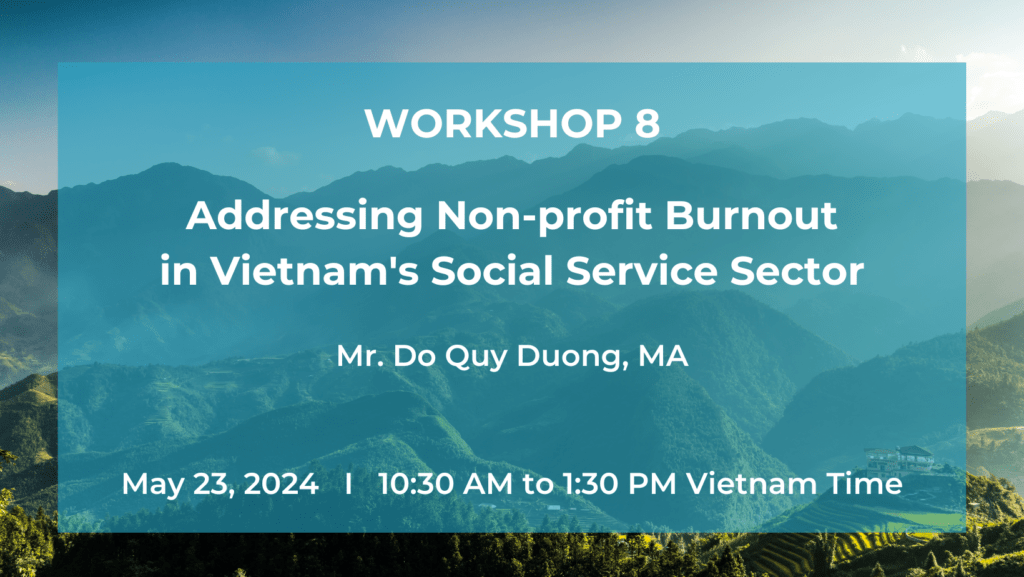
This half-day seminar explores the rising issue of occupational burnout among social workers and development practitioners in Vietnam. It specifically focuses on how social service organizations, including public, local NGOs and CBOs, can better address burnouts and support their staff’s mental well-being with preventive measures at the organizational level. Through this seminar, participants can examine the definition of burnout, its symptoms (emotional, physical, mental), and potential causes within the social service sector, such as heavy workloads, demanding grant requirements, understaffing, budgetary constraints, and evolving contexts in the social service sector. Participants can also unpack negative consequences of burnout on both staff well-being and organizational productivity and explore some practical organizational policy and staff initiatives to address burnout.
Do Quy Duong, MA.Duong holds a master’s degree in international development. He is currently a specialist at an NGO, working on issues of multidimensional inequality and advocates for employee well-being and operational efficiency through staff-driven initiatives within his organization. Duong’s career has also included experience as a researcher/teaching assistant at the National University of Singapore, a team leader at Hagar International in Vietnam, and project officer/interpreter for the Vietnam Ministry of Education and Training. As a researcher, Duong’s research interest focuses on multidimensional inequality and vulnerable populations, such as migrant workers, extreme poor upland households, and women from disadvantaged backgrounds.
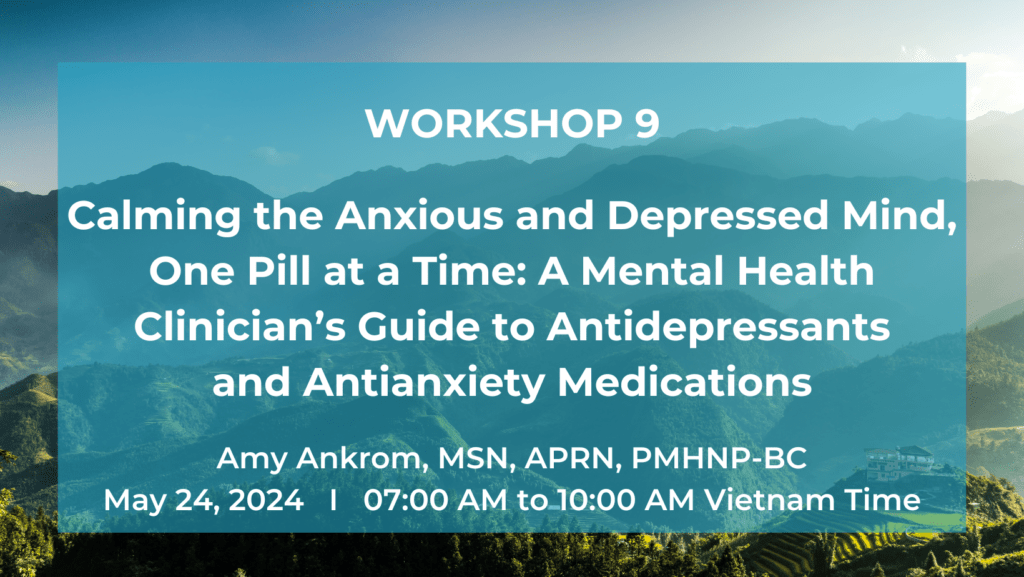
Antidepressants and anti-anxiety medications will be examined with the aim of understanding how these medications are utilized in the management of depression and anxiety disorders. The discussion will delve into the roles of neurotransmitters in mood regulation, explaining the mechanisms of action for commonly prescribed antidepressants and anti-anxiety medications. Exploration of indications for these medications, along with their associated benefits and potential side effects, will provide valuable insights.
Amy Ankrom, MSN, APRN, PMHNP-BC.Amy is a psychiatric mental health nurse practitioner with over 20 years of experience treating patients with mental health conditions. She is the coordinator of the Post-Masters Psychiatric Mental Health Nurse Practitioner Program at West Virginia University, and also treats patients with mental health conditions in a private practice setting.
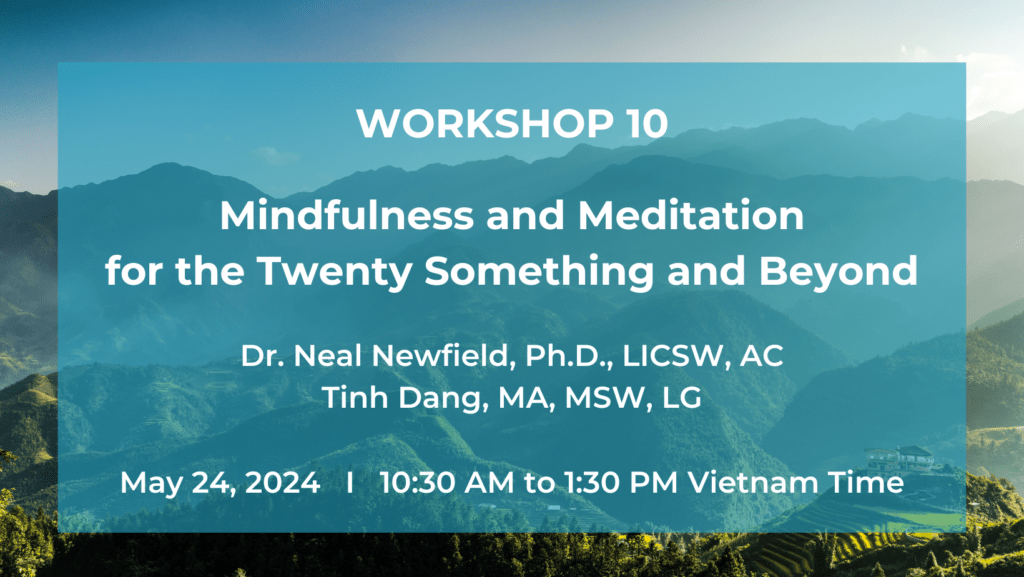
The Mindfulness Institute for Emerging Adults (MIEA) has created a science backed mindfulness and meditation program tailored for the 20 to 30 something student in higher education designed to builds well-being, reduces stress, improves sleep, fosters self-compassion, and promote resilience. This program is now being applied beyond those just in school and is being applied to varying age groups and those in occupations that range from teachers to social workers, mental health providers, and emergency responders. In two, three hour blocks this workshop will provide participants with the basic principles of this program along with at least eight guided meditations that they can practice and share with others. Participants will be guided through meditations in the workshop and asked to practice meditation between the workshop meetings of this course. Workshop 12 will be a continuation of what was started in Workshop 10.
Dr. Neal Newfield, Ph.D., LICSW, ACSW.Neal is an Associate Professor Emeritus of Social Work and an Adjunct Associate Professor of Psychology at West Virginia University. He is a Clinical Fellow and Approved Supervisor for the American Association for Marriage and Family Therapy. Neal has taught courses in individual, marital and family therapy and conducted groups on mindfulness and meditation. He is a certified teacher with the Mindfulness Institute for Emerging Adults (MIEA) and is recognized as a Mindfulness Based Resilience Training (MBRT) coach as well. Currently he is a practicing therapist with the Morgantown Pastoral Counseling Center. His publications range from research to practice. He is a corecipient with his wife Dr. Susan Newfield of the 2018 Inaugural Award by the West Virginia University Office of Global Affairs for Faculty Outstanding Global Contributions and has been recognized for meritorious service by the Vietnam National Ministry of Education and Training.
Tinh Dang, MA, MSW, LGSW.Tinh, in addition to a graduate degree in Social Work, holds a master’s degree in Teaching English for Speakers of Other Languages and Linguistics and is a Fulbright grantee. Presently he is a Behavioral Health Therapist with a Multicultural Focus at the Carruth Center for Counseling and Psychological Services at West Virginia University. Previous positions have included working as a therapist for Valley Healthcare System in Morgantown, West Virginia and the RMIT University in Vietnam. As a therapist he has worked with people of diverse backgrounds including children, adolescents, college students, adults, seniors, couples, families, substance users, and members of the LGBTQIA+ community.
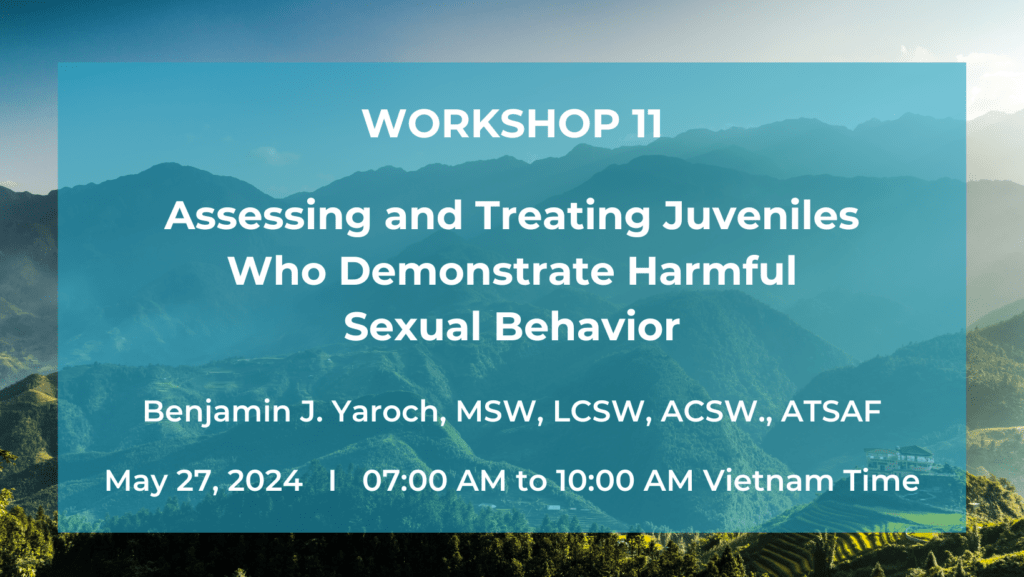
The assessment and treatment of juveniles exhibiting harmful sexual behavior will be examined from a Western perspective. Assessment methods for this population will be presented along with how juvenile sexual offending behavior is operationally defined. The impact of the Court System and probation oversight of the assessment and treatment process that occurs will be examined. Examples of actual assessments and recommendation with the language to use for Court ordered evaluations will be given. Participants will be encouraged to reflect on the Court and Probation System in Vietnam with an eye toward the utility of these approached and how they may be adapted and used within the Vietnamese legal system.
Benjamin J. Yaroch, MSW, LCSW, ACSW., ATSAFBen is a Licensed Clinical Social Worker, a Member of the Academy of Certified Social Workers, and a Fellow and Clinical Member of the Association for The Treatment & Prevention of Sexual Abuse. He is familiar with working with juveniles and families possessed of challenging behaviors such as resistance to authority, school problems, chronic and persistent rule breaking, personal trauma, illegal behaviors, and violence. Ben is dedicated to treating children, adolescents, and young adults with acute or chronic concerns of problematic or harmful sexual behaviors. His expertise is recognized by Court and county agencies and he has over 25 years’ experience.
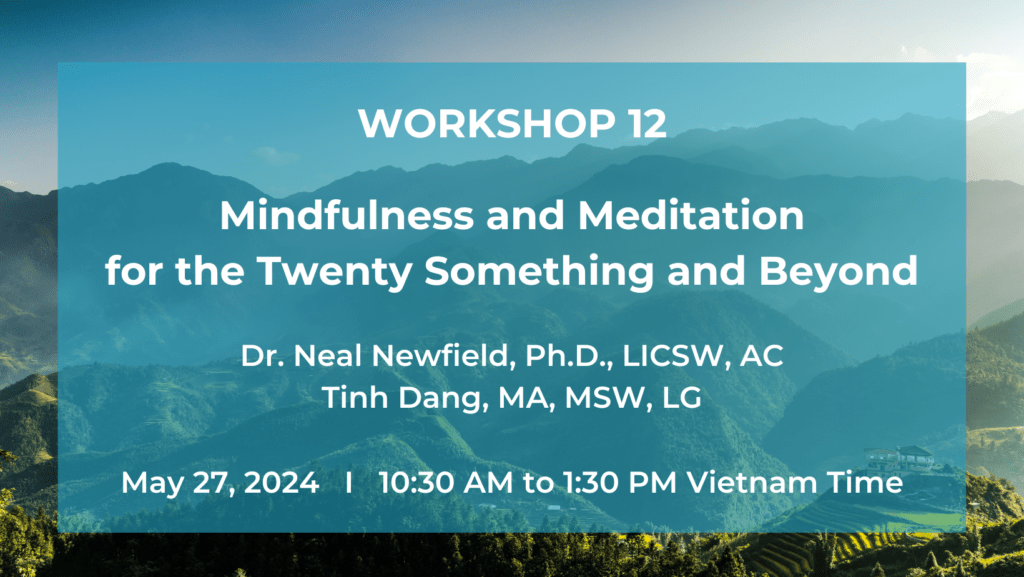
The Mindfulness Institute for Emerging Adults (MIEA) has created a science backed mindfulness and meditation program tailored for the 20 to 30 something student in higher education designed to builds well-being, reduces stress, improves sleep, fosters self-compassion, and promote resilience. This program is now being applied beyond those just in school and is being applied to varying age groups and those in occupations that range from teachers to social workers, mental health providers, and emergency responders. In two, three hour blocks this workshop will provide participants with the basic principles of this program along with at least eight guided meditations that they can practice and share with others. Participants will be guided through meditations in the workshop and asked to practice meditation between the workshop meetings of this course.
Dr. Neal Newfield, Ph.D., LICSW, ACSW.,Neal is an Associate Professor Emeritus of Social Work and an Adjunct Associate Professor of Psychology at West Virginia University. He is a Clinical Fellow and Approved Supervisor for the American Association for Marriage and Family Therapy. Neal has taught courses in individual, marital and family therapy and conducted groups on mindfulness and meditation. He is a certified teacher with the Mindfulness Institute for Emerging Adults (MIEA) and is recognized as a Mindfulness Based Resilience Training (MBRT) coach as well. Currently he is a practicing therapist with the Morgantown Pastoral Counseling Center. His publications range from research to practice. He is a corecipient with his wife Dr. Susan Newfield of the 2018 Inaugural Award by the West Virginia University Office of Global Affairs for Faculty Outstanding Global Contributions and has been recognized for meritorious service by the Vietnam National Ministry of Education and Training.
Tinh Dang, MA, MSW, LGSW.Tinh, in addition to a graduate degree in Social Work, holds a master’s degree in Teaching English for Speakers of Other Languages and Linguistics and is a Fulbright grantee. Presently he is a Behavioral Health Therapist with a Multicultural Focus at the Carruth Center for Counseling and Psychological Services at West Virginia University. Previous positions have included working as a therapist for Valley Healthcare System in Morgantown, West Virginia and the RMIT University in Vietnam. As a therapist he has worked with people of diverse backgrounds including children, adolescents, college students, adults, seniors, couples, families, substance users, and members of the LGBTQIA+ community.
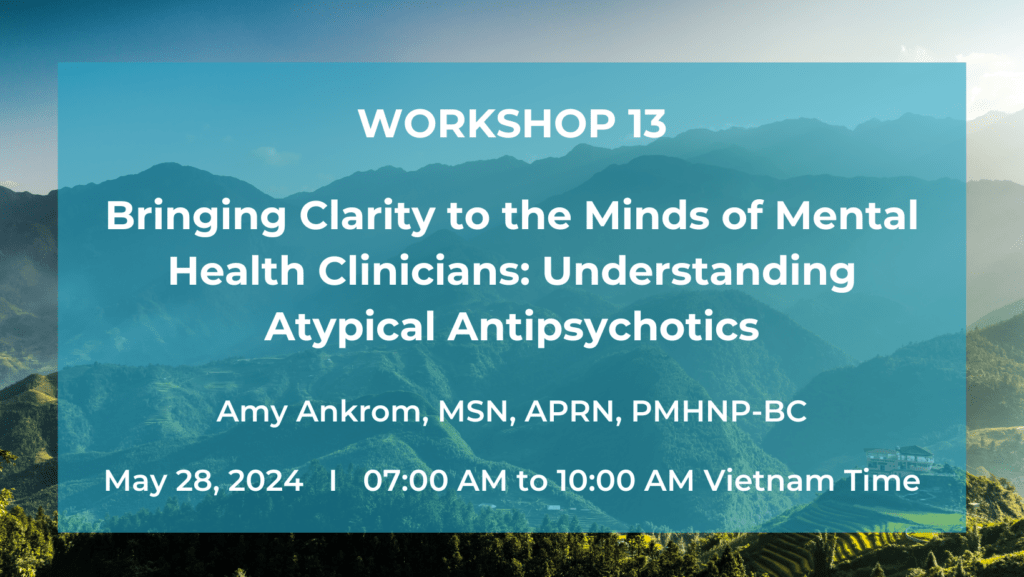
Atypical antipsychotics will be examined with the aim of understanding how these medications are utilized in the management of mood and psychotic disorders. We will explore the neurotransmitters impacted by atypical antipsychotics and the disorders that they manage. Their many benefits, especially as compared to older antipsychotics, will be reviewed, along with their risks.
Amy Ankrom, MSN, APRN, PMHNP-BCAmy is a psychiatric mental health nurse practitioner with over 20 years of experience treating patients with mental health conditions. She is the coordinator of the Post-Masters Psychiatric Mental Health Nurse Practitioner Program at West Virginia University, and also treats patients with mental health conditions in a private practice setting.
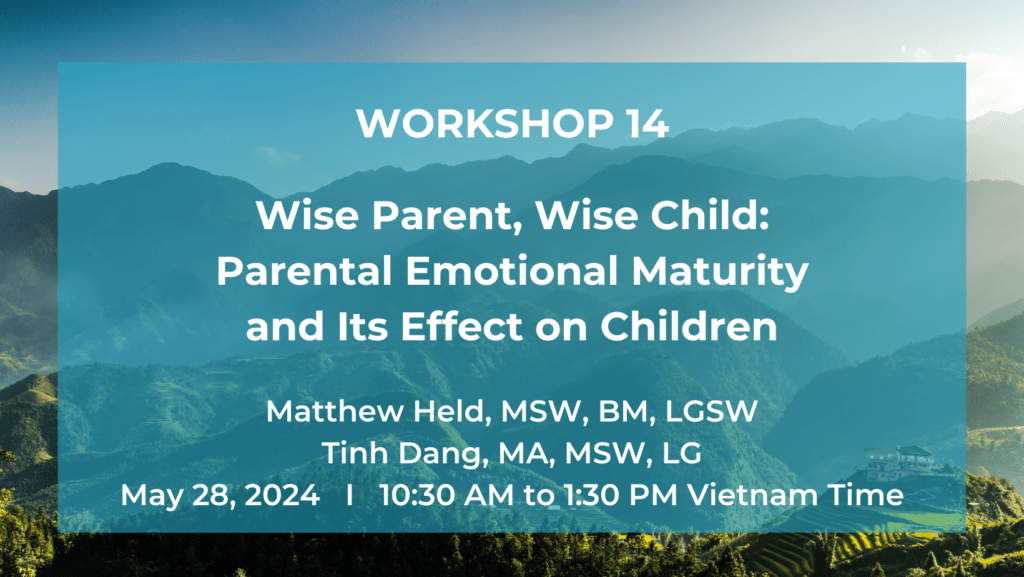
Emotional intelligence (EI) has gained popularity in psychology. Research on EI is increasingly referenced in corporate and popular cultural contexts as well. Social Workers, addressing the needs of individuals and families, have found EI an invaluable tool when addressing issues effecting clients. EI is understood to be an important factor in how people cope with the world. It is a key determinant of how clients will meet their goals. This workshop will introduce, define, and explore specifically how the maturity of parents influences the development of young and adult children. Actual case studies will be used to illustrate key points. Practical strategies applying EI research and understanding will be offered as enhancements to common therapeutic modalities and how these can help improve client outcomes. Workshop 16 will be a continuation of what was started in Workshop 14.
Matthew Held, MSW, BM, LGSW.Matt is a psychiatric social worker with the Morgantown Pastoral Counseling Center located in Morgantown, West Virginia. In his practice he sees individuals, couples, and families who come from diverse backgrounds. A particular focus of interest has been men’s and couple’s issues, performance anxiety, self-esteem and serving the LGBTQIA+ community. Mindfulness Based practice, Solutions Focused Therapy and Cognitive Behavioral Therapy are his favored modalities. Matthew has built his practice around a person-centered philosophy and enjoys the opportunity to help his clients realize the greatest version of themselves.
Tinh Dang, MA, MSW, LGSW.Tinh, in addition to a graduate degree in Social Work, holds a master’s degree in Teaching English for Speakers of Other Languages and Linguistics and is a Fulbright grantee. Presently he is a Behavioral Health Therapist with a Multicultural Focus at the Carruth Center for Counseling and Psychological Services at West Virginia University. Previous positions have included working as a therapist for Valley Healthcare System in Morgantown, West Virginia and the RMIT University in Vietnam. As a therapist he has worked with people of diverse backgrounds including children, adolescents, college students, adults, seniors, couples, families, substance users, and members of the LGBTQIA+ community.
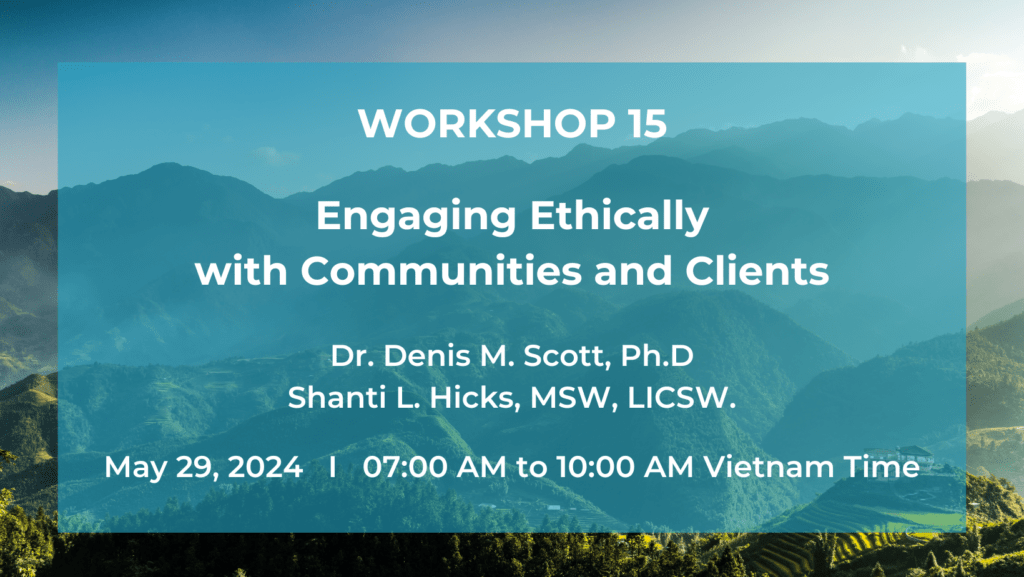
This workshop will present approaches for ethical engagement to consider when working in both direct social work practice as well as overarching principles for values-based community work. Although specific principles may vary somewhat between each different professional association, and from country to country, general similarities in ethical values will be explored. By examining overarching ethical frameworks participants will understand broad categorial definitions and then dive deeper into practical practice issues through case studies and attendees’ real world examples. Participants will also explore particular codes of ethics and discuss relevant components as they may be tied to important values for effective practices. Workshop #17 will be a continuation of what was started in Workshop #15.
Dr. Denis M. Scott, Ph.D.Denis is a West Virginia University Extension Professor and the Community Engagement and Global Awareness Specialist. He is also Assistant Director of Academic Engagement with the WVU Center for Community Engagement. He holds a PhD in Human and Community Development and is certified as a Professional Community and Economic Developer. Denis is also an Intercultural Development Inventory (IDI) Qualified Administrator. He has designed and delivered cultural competency trainings for schools, nonprofits, health care providers, municipalities, and state agencies. His applied workforce trainings help people learn about and understand differences among communities while respecting the importance of working with others who might be unlike themselves. Dr. Scott has led various international programs as well as inter-cultural exchanges and experiential learning programs to help participants understand themselves in local, national, and global contexts.
Shanti L. Hicks, MSW, LICSW.Shanti earned her Master’s degree in Social Work from West Virginia University. She is a Licensed Independent Clinical Social Worker and holds a Graduate Interdisciplinary Certificate in Disability Studies. Shanti also holds a Training Certificate through the WVU Center for Excellence in Disabilities Leadership Education in Neurodevelopmental Disabilities (LEND). Shanti’s career interests include an interest in youth and family dynamics.
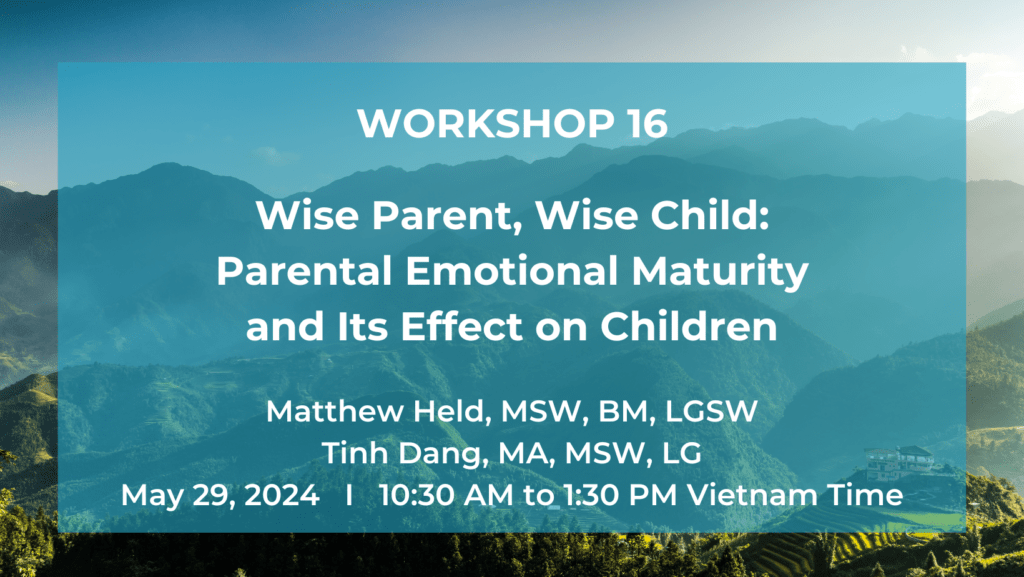
Emotional intelligence (EI) has gained popularity in psychology. Research on EI is increasingly referenced in corporate and popular cultural contexts as well. Social Workers, addressing the needs of individuals and families, have found EI an invaluable tool when addressing issues effecting clients. EI is understood to be an important factor in how people cope with the world. It is a key determinant of how clients will meet their goals. This workshop will introduce, define, and explore specifically how the maturity of parents influences the development of young and adult children. Actual case studies will be used to illustrate key points. Practical strategies applying EI research and understanding will be offered as enhancements to common therapeutic modalities and how these can help improve client outcomes.
Matthew Held, MSW, BM, LGSW.Matt is a psychiatric social worker with the Morgantown Pastoral Counseling Center located in Morgantown, West Virginia. In his practice he sees individuals, couples, and families who come from diverse backgrounds. A particular focus of interest has been men’s and couple’s issues, performance anxiety, self-esteem and serving the LGBTQIA+ community. Mindfulness Based practice, Solutions Focused Therapy and Cognitive Behavioral Therapy are his favored modalities. Matthew has built his practice around a person-centered philosophy and enjoys the opportunity to help his clients realize the greatest version of themselves.
Tinh Dang, MA, MSW, LGSW.Tinh, in addition to a graduate degree in Social Work, holds a master’s degree in Teaching English for Speakers of Other Languages and Linguistics and is a Fulbright grantee. Presently he is a Behavioral Health Therapist with a Multicultural Focus at the Carruth Center for Counseling and Psychological Services at West Virginia University. Previous positions have included working as a therapist for Valley Healthcare System in Morgantown, West Virginia and the RMIT University in Vietnam. As a therapist he has worked with people of diverse backgrounds including children, adolescents, college students, adults, seniors, couples, families, substance users, and members of the LGBTQIA+ community.
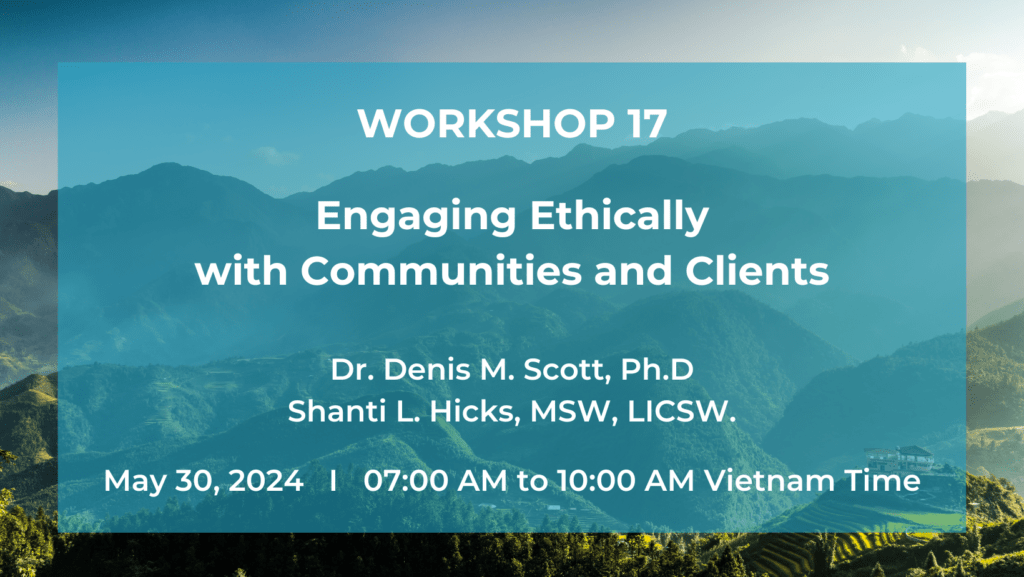
This workshop will present approaches for ethical engagement to consider when working in both direct social work practice as well as overarching principles for values-based community work. Although specific principles may vary somewhat between each different professional association, and from country to country, general similarities in ethical values will be explored. By examining overarching ethical frameworks participants will understand broad categorial definitions and then dive deeper into practical practice issues through case studies and attendees’ real world examples. Participants will also explore particular codes of ethics and discuss relevant components as they may be tied to important values for effective practices.
Dr. Denis M. Scott, Ph.D.Denis is a West Virginia University Extension Professor and the Community Engagement and Global Awareness Specialist. He is also Assistant Director of Academic Engagement with the WVU Center for Community Engagement. He holds a PhD in Human and Community Development and is certified as a Professional Community and Economic Developer. Denis is also an Intercultural Development Inventory (IDI) Qualified Administrator. He has designed and delivered cultural competency trainings for schools, nonprofits, health care providers, municipalities, and state agencies. His applied workforce trainings help people learn about and understand differences among communities while respecting the importance of working with others who might be unlike themselves. Dr. Scott has led various international programs as well as inter-cultural exchanges and experiential learning programs to help participants understand themselves in local, national, and global contexts.
Shanti L. Hicks, MSW, LICSW., .Shanti earned her Master’s degree in Social Work from West Virginia University. She is a Licensed Independent Clinical Social Worker and holds a Graduate Interdisciplinary Certificate in Disability Studies. Shanti also holds a Training Certificate through the WVU Center for Excellence in Disabilities Leadership Education in Neurodevelopmental Disabilities (LEND). Shanti’s career interests include an interest in youth and family dynamics.
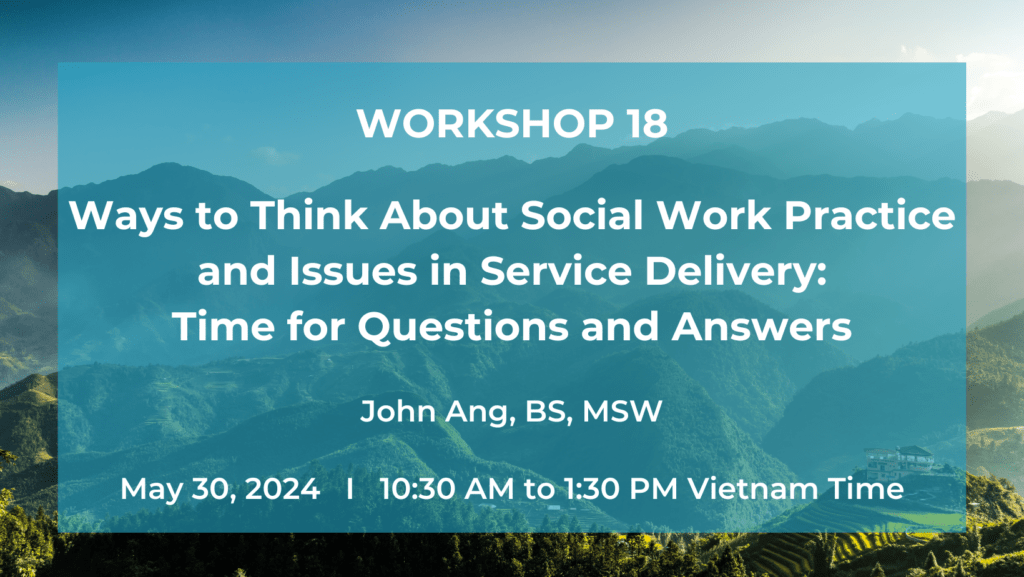
This workshop will go beyond the “nuts and bolts” of social work and sketch a broad canvas on social work practice in general. Participants will be encouraged to submit question in writing prior to the workshop with dominant themes in the question influencing the directions the workshop takes. This session will also be highly interactional with questions taken in session encouraging a spontaneous and lively exchange.
John Ang, BS, MSW.John is a Senior Fellow with the National University of Singapore where he has taught for over 30 plus years. His social work practice has taken him to Yangon, Myanmar where he helped put in place a training program for social welfare officers and a social work diploma program. With the Singapore International Foundation (SIF) he helped enhance Hanoi’s social work curriculum, facilitating training and practice to better address Vietnam’s complex social problems. Internationally, John served on the Boards of all of the three apex world bodies of social work, social work education and social welfare, namely, the International Federation of Social Workers (IFSW), International Association of Schools of Social Work (IASSW) and the International Council of Social Service (ICSW). Until recently, he was President of the International Federation of Social Workers (Asia Pacific). John is a past president of the Singapore Association of Social Workers having served three terms in that capacity. He has also served as resource person to the United Nations ESCAP office in Bangkok in its first Decade of the Disabled initiative. For his contribution to social services, John has twice been honored by the Singapore Government and received the Public Service Medal and the Public Service Star. He has taught at the University of Hawaii, Cornell University in Ithaca, New York and Xiamen University in China. John has taught all the core subjects in social work and is active in designing new ones such as social work and the media. He has a strong interest in social theory, child development, family life education, couple counseling and disability studies, especially autism. He teaches, consults and publishes in these areas.
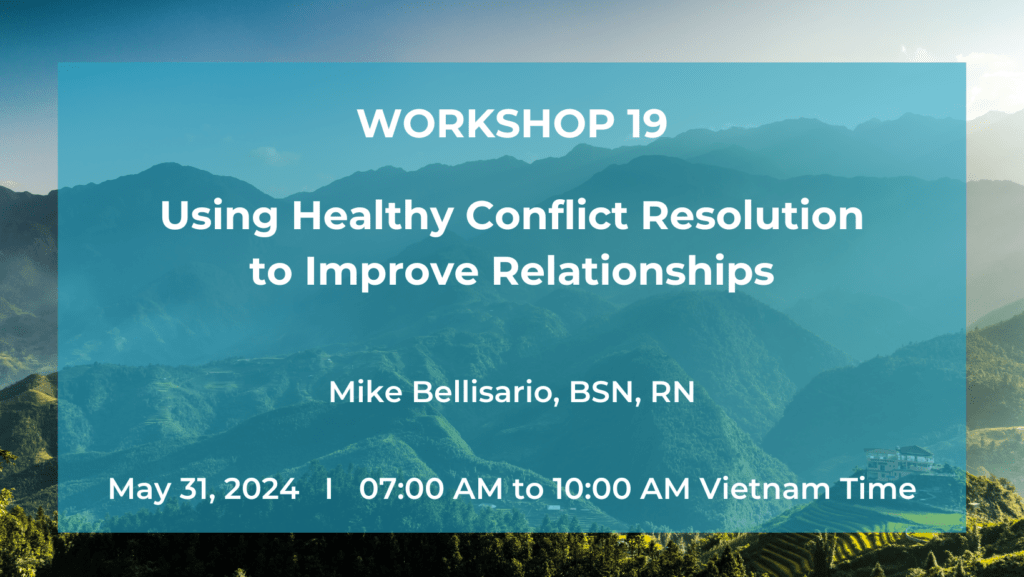
Interpersonal conflict can be extremely challenging to handle in a way that builds relationships. This session will provide insights into managing our own behavior and emotions so that we can approach conflict in a way that not only resolves escalated situations, but also builds healthy relationships into the future. Using proactive intervention tools, verbal and non-verbal communication techniques, and identifying the best responses and interventions to use during escalated interactions will be addressed. Communicating during conflict is an area that causes even effective communicators to have difficulty. This training will include elements of the Mandt System and help individuals learn better communication and conflict management skills so that they can approach conflict resolution with more confidence.
Mike Bellisario, BSN, RN.Mike is an instructor of psychiatric and mental health nursing at West Virginia University and is presently pursuing a graduate degree in nursing. He has worked in various community and hospital environments over the past 30 years, specializing in milieu management, de-escalation skills, and building healthy relationships. Mike is a national instructor for The Mandt System, an international staff development program, that focuses on a comprehensive, integrated approach to preventing, de-escalating, and if necessary, intervening when the behavior of an individual poses a threat of harm to themselves and/ or others. He continues to provide this training to students and healthcare providers. Mike also has experience in behavior modification and positive behavioral interventions and supports (PBIS), which he incorporates into strategies for successful interactions.
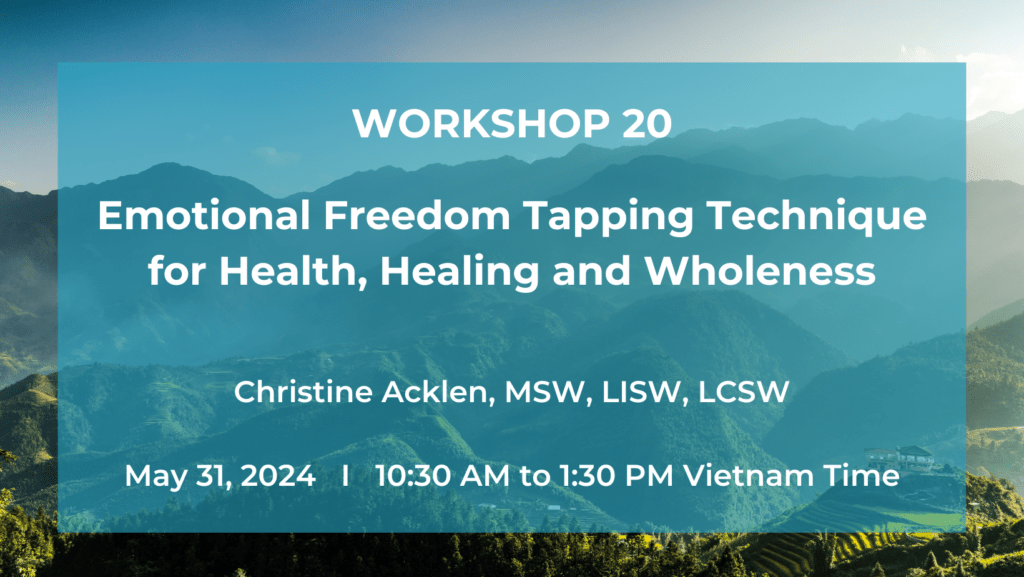
The history, science and basics of the evidence-based emotional freedom tapping technique (EFT) will be explored. EFT, or tapping, is an alternative treatment approved by the American Psychological Association that is utilized for decreasing physical pain and emotional distress. In an EFT session, specific acupressure points are tapped with one’s fingertips in a certain sequence and effect the parasympathetic nervous system, which activates calming responses impacting pain, anxiety, and depression. EFT will be taught both experientially and through didactic presentation. Participants will learn and practice this somatic intervention.
Christine Acklen, MSW, LISW, LCSW.Christine is a clinical social worker and psychotherapist with over 30 years’ experience working with individuals and families across the age spectrum. Currently she is a clinical consultant for the city of Albuquerque, New Mexico, USA and has a private psychotherapy practice. Chris has worked in various settings, including mental and physical health clinics, a homeless family program, hospitals, schools and various counseling agencies. In addition to individual, group, couples and family counseling, she specialized in behavioral therapy for clients with developmental disabilities. Chris has supervised licensed social workers, graduate level social work interns, trained agency staff on best practices and provided consultation services to care providers and multidisciplinary team members including attending psychiatrists.
Please help spread the word and invite others. For questions, email swsi.htctxh@pacificlinks.org.